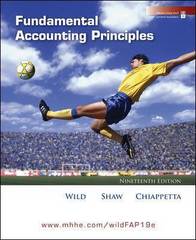Question
Accounting 325: Case using the FASB Accounting Standards Codification Due Apr. 24, 2014 Soon after beginning the year-end audit work on Oct 24th at the
Accounting 325: Case using the FASB Accounting Standards Codification Due Apr. 24, 2014 Soon after beginning the year-end audit work on Oct 24th at the Wallenda Company, the auditor has the following conversation with the controller. Controller: The year ended October 31st should be our most profitable in history and, as a consequence, the Board of Directors has just awarded the officers generous bonuses. Auditor: I thought profits were down this year in the industry, according to your latest interim report. Controller: Well, they were down but 10 days ago we closed a deal that will give us a substantial increase for the year. Auditor: 0h, what was it? Controller: Well, you remember a few years ago our former president bought stock in Pearson Enterprises because he had grandiose ideas about becoming a conglomerate. For six years we have not been able to sell this stock, which cost us $3,000,000 and has not paid a nickel in dividends. Thursday we sold this stock to Union City, Inc. for $4,000,000. So we have a gain of $700,000 ($1,000.000 pretax) which will increase our net income for the year to $4,000,000 compared with last year?s $3,800,000. As far as I know, we?ll be the only company in the industry to register an increase in net income this year. That should help the market value of the stock! Auditor: Do you expect to receive the $4,000,000 in cash by Octobrt 31st, your fiscal year end? Controller: No. Although Union City is an excellent company, they are a little tight for cash because of their rapid growth. Consequently, they are going to give us a $4,000,000 noninterest-bearing note due $400,000 per year for the next 10 years. The first payment is due on March 31 of next year. Auditor: Why is the note noninterest-bearing? Controller: Because that?s what everybody agreed to. Since we don?t have any interest-bearing debt, the funds invested in the note do not cost us anything and besides, we were not getting any dividends on Pearson Enterprises stock. REQUIRED: Do you agree with the way the controller has accounted for the transaction? If not, how should the transaction be accounted for? Some questions to be considered: 1. What was the value of stock--when it was purchased and when it was sold? 2. Given the uncertainty surrounding the collectability of the note, did an exchange occur? How do we account for the different scenarios, exchange or no exchange? 3. What goes into determining an interest rate? 4. What is the value of the note? Why does it matter and how do we account for it? 5. What is the value of the gain/loss and how does it effect net income? Your response should be typed, double spaced, and no more than two pages in length. 
Step by Step Solution
There are 3 Steps involved in it
Step: 1

Get Instant Access to Expert-Tailored Solutions
See step-by-step solutions with expert insights and AI powered tools for academic success
Step: 2

Step: 3

Ace Your Homework with AI
Get the answers you need in no time with our AI-driven, step-by-step assistance
Get Started


